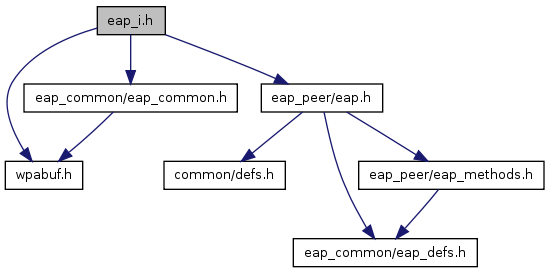#include "wpabuf.h"#include "eap_peer/eap.h"#include "eap_common/eap_common.h"

Go to the source code of this file.
| #define EAP_PEER_METHOD_INTERFACE_VERSION 1 |
Definition at line 228 of file eap_peer/eap_i.h.
| enum EapDecision |
Definition at line 24 of file eap_peer/eap_i.h.
| enum EapMethodState |
Definition at line 28 of file eap_peer/eap_i.h.
eap_allowed_method - Check whether EAP method is allowed : Pointer to EAP state machine allocated with eap_peer_sm_init() : Vendor-Id for expanded types or 0 = IETF for legacy types : EAP type Returns: 1 = allowed EAP method, 0 = not allowed
| void eap_clear_config_otp | ( | struct eap_sm * | sm | ) |
eap_clear_config_otp - Clear used one-time password : Pointer to EAP state machine allocated with eap_peer_sm_init()
This function clears a used one-time password (OTP) from the current network configuration. This should be called when the OTP has been used and is not needed anymore.
| struct eap_peer_config* eap_get_config | ( | struct eap_sm * | sm | ) | [read] |
eap_get_config - Get current network configuration : Pointer to EAP state machine allocated with eap_peer_sm_init() Returns: Pointer to the current network configuration or NULL if not found
EAP peer methods should avoid using this function if they can use other access functions, like eap_get_config_identity() and eap_get_config_password(), that do not require direct access to struct eap_peer_config.
| struct wpa_config_blob* eap_get_config_blob | ( | struct eap_sm * | sm, | |
| const char * | name | |||
| ) | [read] |
eap_get_config_identity - Get identity from the network configuration : Pointer to EAP state machine allocated with eap_peer_sm_init() : Buffer for the length of the identity Returns: Pointer to the identity or NULL if not found
eap_get_config_new_password - Get new password from network configuration : Pointer to EAP state machine allocated with eap_peer_sm_init() : Buffer for the length of the new password Returns: Pointer to the new password or NULL if not found
eap_get_config_otp - Get one-time password from the network configuration : Pointer to EAP state machine allocated with eap_peer_sm_init() : Buffer for the length of the one-time password Returns: Pointer to the one-time password or NULL if not found
eap_get_config_password - Get password from the network configuration : Pointer to EAP state machine allocated with eap_peer_sm_init() : Buffer for the length of the password Returns: Pointer to the password or NULL if not found
eap_get_config_password2 - Get password from the network configuration : Pointer to EAP state machine allocated with eap_peer_sm_init() : Buffer for the length of the password : Buffer for returning whether the password is stored as a NtPasswordHash instead of plaintext password; can be NULL if this information is not needed Returns: Pointer to the password or NULL if not found
| const char* eap_get_config_phase1 | ( | struct eap_sm * | sm | ) |
eap_get_config_phase1 - Get phase1 data from the network configuration : Pointer to EAP state machine allocated with eap_peer_sm_init() Returns: Pointer to the phase1 data or NULL if not found
| const char* eap_get_config_phase2 | ( | struct eap_sm * | sm | ) |
eap_get_config_phase2 - Get phase2 data from the network configuration : Pointer to EAP state machine allocated with eap_peer_sm_init() Returns: Pointer to the phase1 data or NULL if not found
| void eap_notify_pending | ( | struct eap_sm * | sm | ) |
eap_notify_pending - Notify that EAP method is ready to re-process a request : Pointer to EAP state machine allocated with eap_peer_sm_init()
An EAP method can perform a pending operation (e.g., to get a response from an external process). Once the response is available, this function can be used to request EAPOL state machine to retry delivering the previously received (and still unanswered) EAP request to EAP state machine.
| void eap_set_config_blob | ( | struct eap_sm * | sm, | |
| struct wpa_config_blob * | blob | |||
| ) |
eap_set_config_blob - Set or add a named configuration blob : Pointer to EAP state machine allocated with eap_peer_sm_init() : New value for the blob
Adds a new configuration blob or replaces the current value of an existing blob.